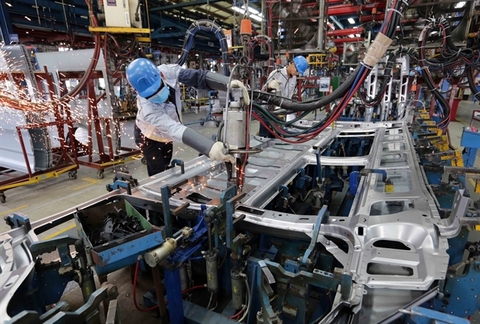 |
|
Vietnam needs to pay more attention to improving its infrastructure and increasing connectivity to attract FDI.
|
Themed “Capitalising on Vietnam’s Investment Opportunities Post COVID-19”, the webinar drew senior leaders from businesses and organisations across Asia, Europe and the US.
Minister of Planning and Investment Nguyen Chi Dung said that trade conflicts among major economies had forced international corporations and enterprises to relocate to avoid high taxes.
The COVID-19 pandemic and its consequences had made countries, international corporations and businesses speed up their investment restructuring plans to avoid dependence on one country or partner.
Many countries had already issued preferential policies and support packages to retain as well as attract foreign investors.
Dung said Vietnam had been taking drastic measures to meet investors’ requirements such as preparing land funds, factories, energy facilities and incentive packages for large projects that applied advanced technology. The country had also created conditions for Vietnamese businesses to join the global value chain.
“With its existing competitive advantages, strong reforms of the investment environment and increasing international position, and positive and effective anti-COVID-19 measures, Vietnam has been highly appreciated by the world community, becoming an attractive and safe investment destination for foreign investors,” he added.
In the context that global FDI is likely to decline by 40 per cent in 2020, Vietnam is looking relatively positive having attracted total registered capital of nearly US$20 billion in the first eight months of the year, with new capital increasing by 6.6 per cent and additional capital by 22.2 per cent.
“These figures are very encouraging, confirming the efforts and determination of the Government and all levels to attract foreign investment, especially high quality FDI,” he said.
The minister said Vietnam was building a 10-year development strategy with institutional breakthroughs, and infrastructure and human resources would continue to be focused on.
Sharing the idea, Governor of the State Bank of Vietnam Le Minh Hung said: “Over the past 20 years, Vietnam has been rated as an attractive destination by foreign investors thanks to many factors, including political, economic and social stability. Policies to facilitate foreign investment play a very important role.”
The Vietnamese Government has pursued this direction, but the challenges brought by the COVID-19 pandemic require the country to be more flexible in its response and take concrete and timely measures to mitigate its impacts and when possible, turn challenges into opportunities.
To seize these opportunities, the Governor said that from 2021-25, the State Bank would continue to give priority to the completion of a monetary-banking legal framework.
Specifically, the Law on Credit Institutions, Law on Deposit Insurance and new regulations will be added to help credit institutions provide a full range of financial services and products.
The central bank will strengthen banking supervision and shift from compliance inspections to risk-based supervision in accordance with international practices and standards.
“The State Bank of Vietnam will continue to ensure a stable macro environment, creating conditions for the banking system to support the economy's recovery, but still focusing on ensuring quality, operational and financial safety.”
From the perspective of an international corporation, C. K. Tong, CEO of BW Industrial Development, said Vietnam had an advantage in growth rate compared to many countries in the region. However, the country needed to pay more attention to improving its infrastructure, and increasing connectivity such as the North-South expressway, special hubs, traffic density and developing local industrial clusters to effectively attract FDI.
“Given its strong fundamentals of a young, dynamic and tech-savvy population, a growing domestic market, a rising middle class and an open economy, Vietnam continues to offer exciting investment opportunities. Many start-ups and multinational corporations have set up their operations in Vietnam to leverage its strategic connectivity and proximity to Asian economies as a gateway to grow their businesses. While COVID-19 is likely here to stay for a while, it should not prevent us from exploring the new opportunities that Vietnam can offer and attempt new strategies to build and sustain growth in the country,” said Nirukt Sapru, CEO of Vietnam and ASEAN & South Asia Cluster Markets, Standard Chartered Bank.
A survey conducted during the Standard Chartered ASEAN Business Forum 2020 showed that 38 per cent of respondents would consider Vietnam for their supply chain diversification. This was the highest ratio among ASEAN countries.
There’s little doubt that Vietnam has been getting a lot of investor attention, evidenced by the strong FDI inflow into the country in recent years.
The webminar was part of the Standard Chartered ASEAN Series, which was started by the virtual Standard Chartered ASEAN Business Forum 2020 in late August. The forum was officiated over by Prime Minister Nguyen Xuan Phuc and attracted 4,700 participants globally. VNS

What Vietnam needs to do to attract quality FDI after Covid-19
Speeding up infrastructure development and improving ease of doing business and vocational training are among things Vietnam can do to make itself more attractive to foreign investors post-Covid-19, according to VinaCapital.

Post-pandemic focus for new investments
A series of favourable policies are expected to be issued by the government’s upcoming taskforce in the country’s bid to attract a new investment wave after the health crisis.